Further information ↗

Guiding Idea
"If I have a thousand ideas and
only one turns out to be good,
I am satisfied."
- Alfred Noble -
Research Areas
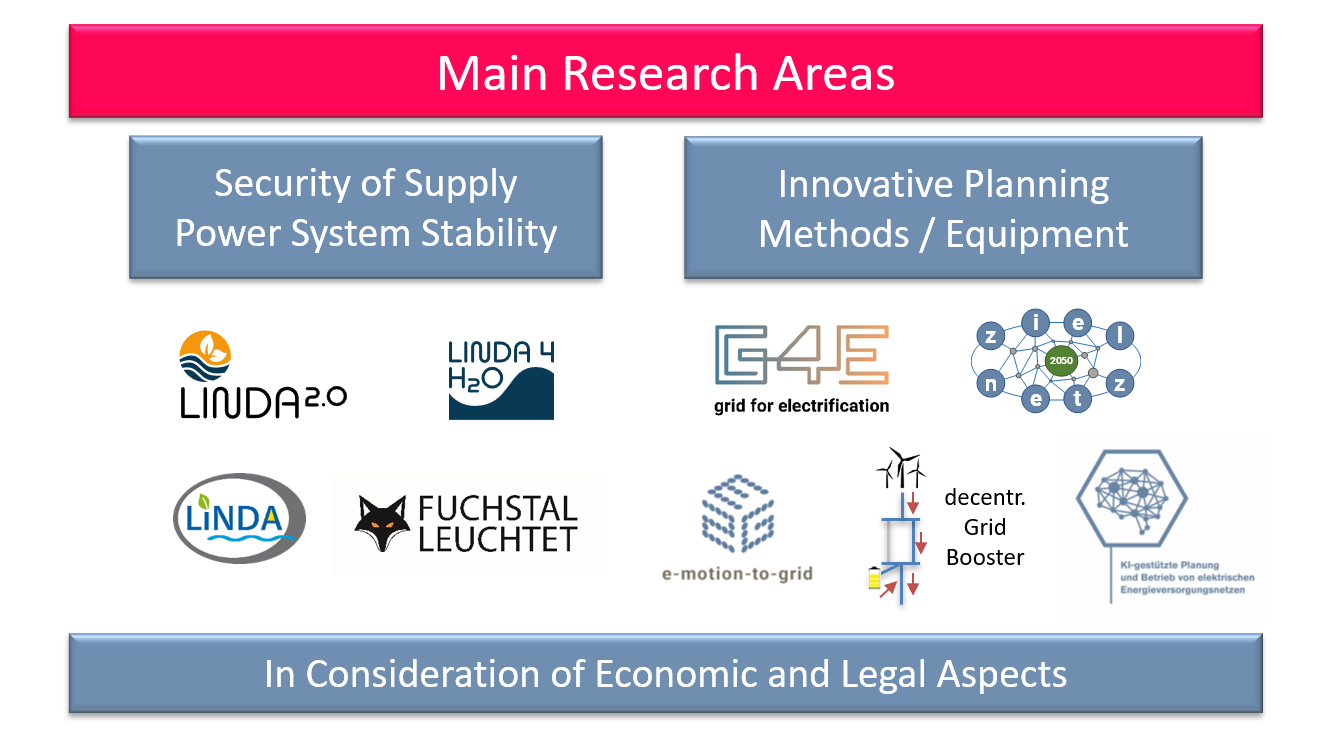
The team around Prof. Dr.-Ing. Michael Finkel works primarily in the field of integration of decentralized renewable energy plants into the distribution grid and thus actively shapes the energy transition. In this context, we are active on the most varied levels: We carry out experiments and simulations in the Laboratory for High-Voltage Engineering and accompany our external and internal partners in the desired professional depth - from consultation to small research projects to complete dissertations. Our motto is: Challenges are our motivation!
Current Research Projects
Fuchstal leuchtet (1. Aug. 2023 - 31. July 2026)

Project description
Within the framework of current political objectives and the associated increasing dependency on electrical energy, driven by the transport and heating sectors, there is a significant shift in power generation: away from large generating plants with synchronous generators towards smaller, converter-based generating facilities. This shift is significantly driven by the increasing use of photovoltaic and wind power plants, which are often integrated into the distribution network as well. This development poses major challenges for the energy supply system but also offers opportunities regarding system services such as control energy, inertia or voltage control. The research project "Fuchstal leuchtet" is dedicated to addressing this issue. In the real-world lab of the energy future in Fuchstal, it is being researched whether stable network operation in practice can be achieved with current technology under the condition that frequency and voltage stability can be ensured without overarching communication to network dynamics. Together with the elenia Institute of the Technical University of Braunschweig, Munich University of Applied Sciences, the municipality of Fuchstal, and the LEW Distribution Network, the following research question will be answered:
How is stable network operation in practice possible in a network without a central control structure, which is exclusively fed and loaded by converters?
Grid for Electrification (G4E) (1. Jan. 2023 - 31. Dec. 2025)
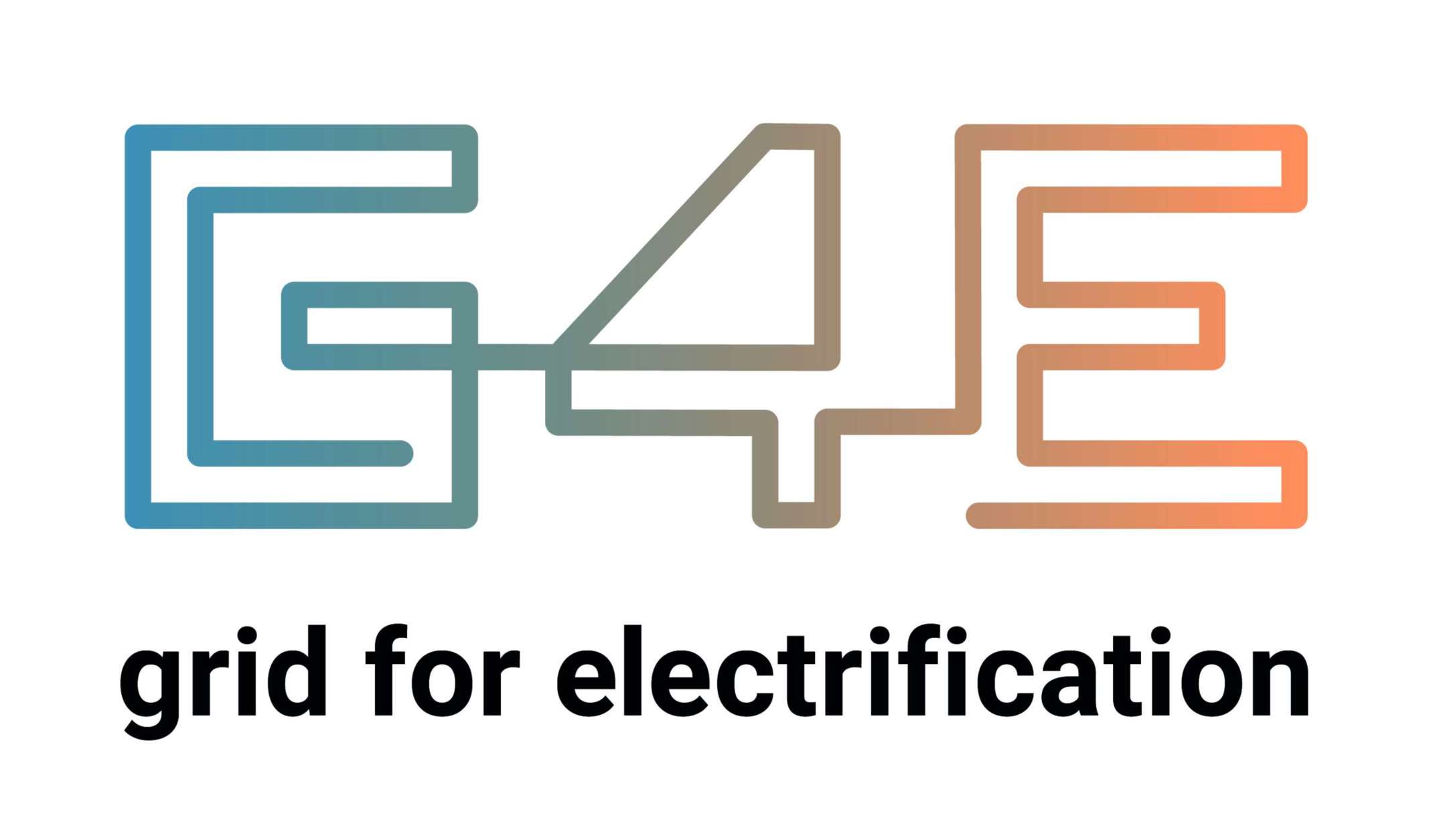
Project description
Power Grid Analysis for Asset Management via Artificial Intelligence Applications (GA³IA) (1. July 2022 - 30. June 2025)
Project Description
The energy sector is undergoing a fundamental transformation characterized by digitalization and the energy transition. The decentralization of the energy system, the connection of new electrical consumers such as e-vehicles or heat pumps, and the growing share of volatile renewable energy generation are leading to new challenges, especially in distribution systems. The impact on the grid is difficult to forecast. In addition, no measurement data is available for large parts of the medium and low-voltage grid. The use of smart meters and controllable components (smart grid) can close this gap. At the same time, a disproportionately higher flood of data must be managed than in the high-voltage grid. This is where AI systems make a valuable contribution.
The main topic, "AI-supported planning and operation of electric power supply networks," of the AI Production Network deals with planning and operating reliable, flexible, and resilient electric power supply networks using many data streams (such as smart meters or smart grids).
In the GA³IA project (Power Grid Analysis for Asset Management via Artificial Intelligence Applications), a model is being developed to predict the state of the medium-voltage grid. With the help of statistical methods from machine learning and, in particular, artificial neural networks, the calculations of local grid utilization will be improved, and critical states can be detected earlier.
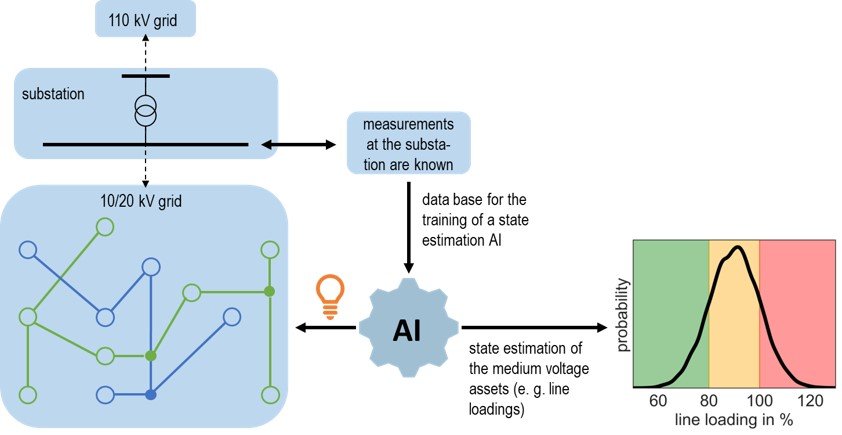
Possible Fields of Wok for Final Theses, Seminar Research Projects and Activities as a Student Assistant
- Participation in the development of the network state estimation model
- Application and comparison of different AI applications for load profile analysis
- Evaluation and processing of simulation and measurement results
Project Partner
- LEW Verteilnetz GmbH
- SWM Infrastruktur GmbH & Co. KG
- Stadtwerke Neuburg an der Donau
Local Island Power Supply of Water Supply Systems with Distributed Generation Systems in Case of Large-Scale Blackouts
Project description
Based on the research project LINDA (Local Island Power Supply of Water Supply Systems with Distributed Generation Systems in Case of Large-Scale Blackouts), in which a concept for stable island network operation in the event of an emergency supply was developed, the research project LINDA 4 H2O (Local Island Power Supply of Water Supply Systems with Distributed Generation Systems in Case of Large-Scale Blackouts) aims to refine the concept and transfer it to typical constellations of public water supply systems and biogas plant.
Project goals
The aim of the research project is
- to transfer the findings of the LINDA research project to other, more typical constellations of decentralized generation units and critical infrastructures;
- to put the methods developed in the LINDA research project to increase the load integration potential into practice;
- to generalize the LINDA concept to such an extent that transferable results and information on the technology and the costs for use in other water supply systems are available after the research project LINDA 4 H2O has been completed;
- to use the knowledge gained in the pilot project to derive recommendations for action for upgrading the operating systems and for the stable setup and operation of emergency supply islands.
Central research fields
The main research areas in the project are:
- Technical and economic evaluation of the suitability of biogas plant for the emergency supply of drinking water supply systems
- Conceptional design and operational management of small isolated grids (microgrids) with decentralized generation systems and selective supply of sensitive consumers (voltage control, reactive power management, frequency control, active power management)
- Further development of the simulation software to simulate the dynamic network behaviour
- Determination of the load switching capability of the biogas unit as a grid forming power unit (possible load steps: P, Q) and development, testing of measures to upgrade the biogas unit (control, load bank concept)
- Development of protection concepts for microgrids with decentralized generation systems
- Transferability of the results to other locations
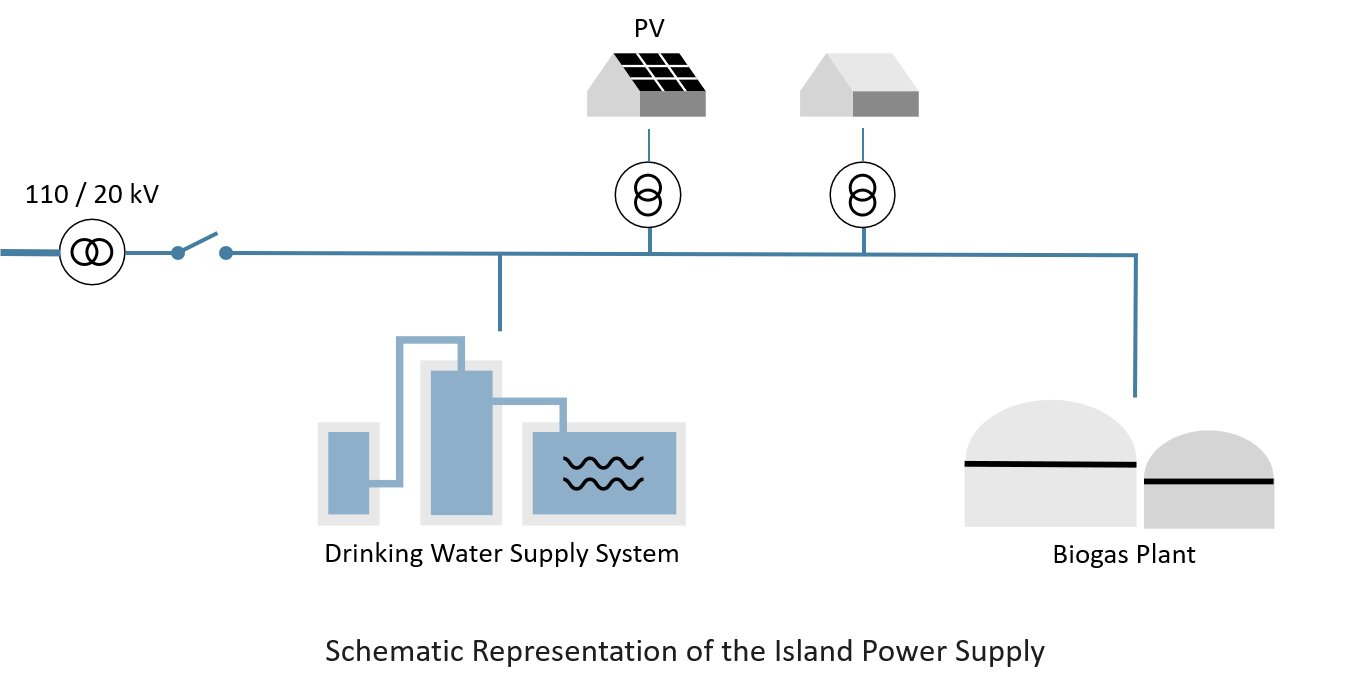
Further information on the research project LINDA 4 H2O:
Contact | |
Phone: | +49 821 5586-3362 |
Completed Research Projects
LINDA 2.0 - Local (partially) Automated Island Power Supply and Emergency Supply with Distributed Generation Systems in the Case of Large-Scale Blackouts (01.02.2021 - 31.07.2024)
Objectives of the LINDA 2.0 research project
- (Partially) automate the LINDA concept for the event of a large scale blackout; an emergency supply of critical infrastructures is possible with significantly reduced manpower.
- Develop a concept for optimized voltage control during the operation of local island grids.
- Apply the LINDA concept to emergency power systems and use this deployment to generate basic knowledge for emergency islands and network restoration. In addition, the database can be used to gain knowledge about the behaviour of (inter-connected) grids in the extended frequency range.
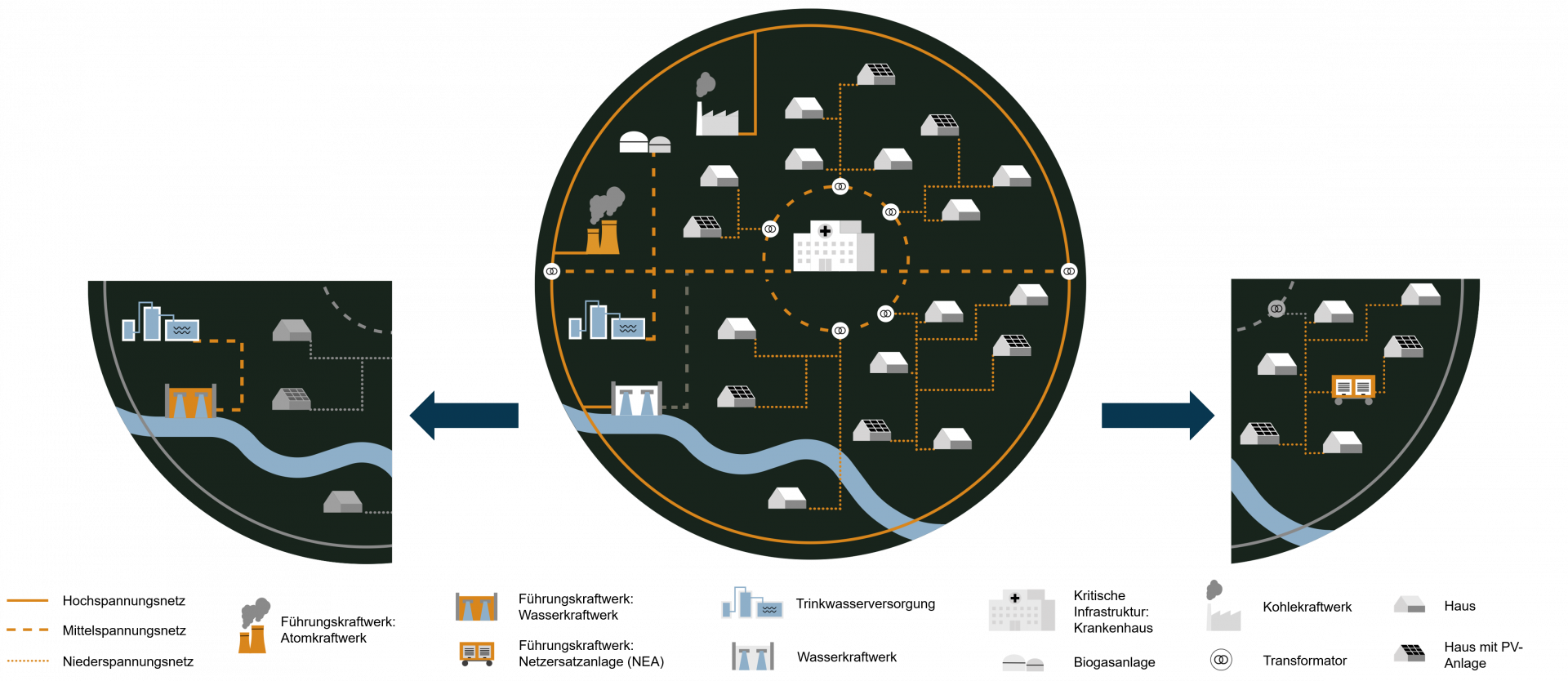
Isolated Network Emergency Supply with Hydropower | Initial Situation: Blackout in the Inter-Connected Electric Power System | Island Network Operation with an Emergency Power Supply Unit |
In the LINDA project, an isolated network emergency supply consisting of a drinking water supply (critical infrastructure) and a hydropower plant (decentralized generation system) was successfully implemented. In LINDA 2.0, the LINDA concept is transferred to another test area and several field tests are carried out. | In interconnected operation, large power plants continuously adjust their generation to the consumption in the grid. If there is a mismatch fo the power balance, this can lead to a large-scale, long-lasting blackout. The analyzes by the Office for Technology Assessment at the German Bundestag show the serious consequences of a long-lasting and large-scale blackout. An emergency supply of critical infrastructure by means of isolated grid, fed by the locally available generation units, can significantly reduce the damage in such scenarios. In the research project LINDA (Local Island Power Supply and Accelerated Grid Restoration with Distributed Generation Systems in Case of Large-Scale Blackouts), a concept for stable island operation in the event of a blackout was developed and tested in a southern German distribution network under real conditions. The social and energy-political significance of the concept results from the increasing complexity of network restoration after major disruptions and the risk of immense economic costs in the event of a failure. | Load bank power supply unit:To derive control strategies for a battery storage system as a hybrid emergency power supply unit and to determine the frequency and voltage-dependent behaviour of loads and generation systems in various real low-voltage networks, a conventional emergency power supply unit (EPSU) is equipped with a load bank and tested in regular EPSU applications in the distribution network. The load bank enables to use the energy from decentralized generation plants during the emergency network operation and to cope with reverse power feed-in from the network. Hybrid power supply unit:During the project, the load bank unit will be replaced by the hybrid unit developed in LINDA 2.0 and tested in the distribution grid. The unit consists of a grid-forming inverter with battery storage and a diesel generator as range extender. In regular operation, the range extender is switched off and the unit works completely emission-free (noise, exhaust gas and CO2). |
System stability analyzes
By means of an emergency power supply units (EPSU) with load bank, various real low-voltage grids are stimulated during emergency power operation in order to determine the frequency and voltage-dependent behavior of loads and generators at different times of the day and year, different PV penetrations and different weather conditions.
Subsequently, the effects of converter-based loads and generating plants on the system stability can be examined with further analyzes. Finally, recommendations and assessments are given as to the extent to which possible parameter changes of converter-based loads and generators positively influence the overall system behavior of local island networks.
Cluster analysis
During the cluster analysis different infrastructures are analyzed regarding their electrical behaviour and power demand. In further investigations requirements for the black start unit are derived.
Critical infrastructures can differ greatly in terms of the equipment to be supplied, load steps, etc., which results in different demands on the load switching capability of the grid-forming power plants. The various load structures are analyzed and clustered in expert discussions and with the help of a questionnaire to the operators of critical infrastructure. In addition, measurements are carried out on relevant equipment. Subsequently, requirements for grid-forming power plants for emergency supply islands with various critical infrastructures can be derived.
Final Report (in German)
Contact person | |
Tobias Lechner | |
Scientific assistant | |
Phone: | |
Fax: | +49 821 5586-3360 |
Contact person | |
Sebastian Seifried | |
Scientific assistant | |
Phone: | |
Fax: | +49 821 5586-3360 |
Participating project partners
- Hochschule Augsburg
- Technische Universität München
- Zweckverband Landeswasserversorgung
- KIMA Automatisierung, Gesellschaft für elektronische Steuerungstechnik und Konstruktion mbH
- LEW Wasserkraft GmbH
- LEW Verteilnetz GmbH
- AVS Aggregatebau GmbH
- Obere Donau Kraftwerke AG
- Universitätsklinikum Leipzig AöR
- MTU Onsite Energy
- Cluster Leistungselektronik
E-Motion-to-Grid (01.11.2019 - 31.10.2022)
Aim of the Project:
The project E-Motion-to-Grid develops innovative concepts for the integration of charging infrastructure in urban distribution grids, which are facing enormous challenges due to the electrification of the transport sector. The basis of the project is a measurement campaign to analyse the charging profiles and behaviour as well as the development of future scenarios with focus on business models. The scenarios for charging infrastructure are integrated in the simulation model of the distribution gird to identify optimal integration measures. Due to lack of space as well as complicated construction and approval procedures in urban areas the solutions need to be flexible, in near-term and cost-effective. One of these intelligent integration measurers is a battery storage system, which is installed in a large car park for load management at the gird connection point of charging stations.
Scientific Assistant:
- Simon Kreutmayr
Central Research Topics:
- Measurements in medium and low voltage networks using grid analyzers
- Creation of a simulation model
- Future trends in the fields of electromobility and power to heat
- Grid integration of decentralized generation plants and electromobility
- Derive recommendations for action for distribution system operators
Research Results, see:
- Kreutmayr, S.: Elektromobilität im städtischen Verteilnetz - Modellierung und Auswirkungen auf die Nieder- und Mittelspannungsebene, kooperative Promotion HS Augsburg und TU München (Prof. Dr.-Ing. Rolf Witzmann), 2023, mediaTUM.
Project Partner:
- SWM Infrastruktur GmbH & Co. KG, Munich
- Technical University of Munich, Prof. Dr.-Ing. R. Witzmann
- Augsburg University of Applied Sciences, Prof. Dr.-Ing. M. Finkel MBA
Further Information about the Research Project E-Motion-to-Grid:
Target Grid Planning (01.03.2020 - 31.03.2022)
Aim of the Project:
The 110 kV network of an urban distribution network operator is to be completely redesigned using a "green field" approach.This means that all substation locations are fixed and the lines between the substations can be completely redesigned.The aim is to find networks that have a larger, maximum supplyable capacity (taking into account marginal parameters such as security of supply and flexibility in network management) than the currently existing network.
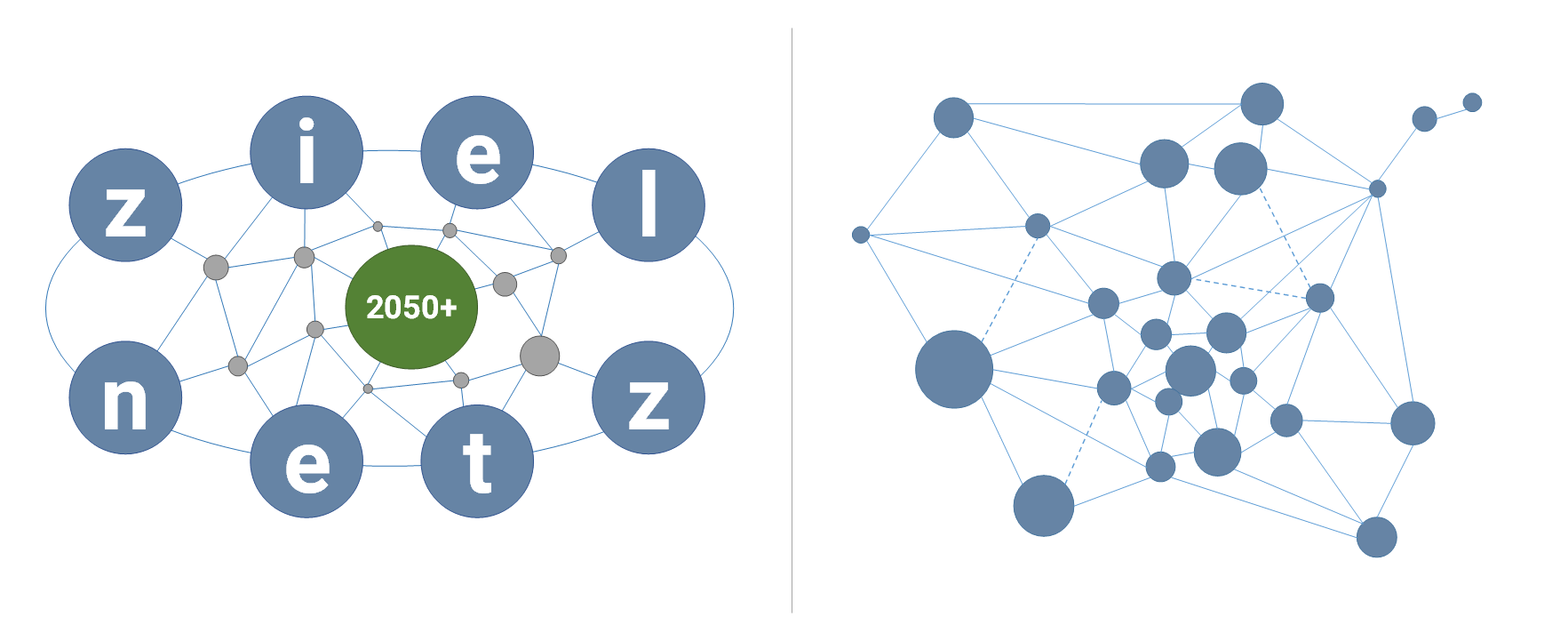
Aim of the Project:
As a result of the German energy transition, urban distribution network operators are facing immense challenges over the next few years. For example, new electrical consumers (e.g. region-wide supply of electric charging stations for e-mobility, battery storage systems, heat pumps for low-energy houses) have to be connected to the distribution network and the consumption structure is changing (e.g. due to self-consumption of the electricity generated by PV systems) but also an increased use of generating facilities for the provision of control energy (virtual power plants and load management). These new requirements must be taken into account in future when designing urban distribution grids. The innovative planning/operation concepts and intelligent technologies used in rural distribution networks can only be used to a limited extent in the city network, as they primarily target the low voltage grid. In the city network, however, the energy transition takes place primarily in the medium voltage network and on the consumer side.
The research project focuses on identifying the challenges arising from the energy transition specific to urban distribution grids.
Contact | |
Phone: | +49 821 5586-3639 |
Extension of MV/LV Network Models in the Asset Management of a Distribution System Operator (01.10.2019 - 31.09.2020)
Central Research Topics
- Evaluation and aggregation of existing data from different internal and external sources as input for the extension of MV/LV network models
- Creation of evaluation procedures for use in asset management
- Supporting preliminary studies for a research project in the area of data analysis and data interfaces
Contact | |
Phone: | +49 821 5586-3596 |
Next M-Grid (01.09.2017 - 31.03.2019)
Project description
As a result of the German energy transition, urban distribution network operators are facing immense challenges over the next few years. For example, new electrical consumers (e.g. region-wide supply of electric charging stations for e-mobility, battery storage systems, heat pumps for low-energy houses) have to be connected to the distribution network and the consumption structure is changing (e.g. due to self-consumption of the electricity generated by PV systems) but also an increased use of generating facilities for the provision of control energy (virtual power plants and load management). These new requirements must be taken into account in future when designing urban distribution grids. The innovative planning/operation concepts and intelligent technologies used in rural distribution networks can only be used to a limited extent in the city network, as they primarily target the low voltage grid. In the city network, however, the energy transition takes place primarily in the medium voltage network and on the consumer side.
The research project focuses on identifying the challenges arising from the energy transition specific to urban distribution grids.
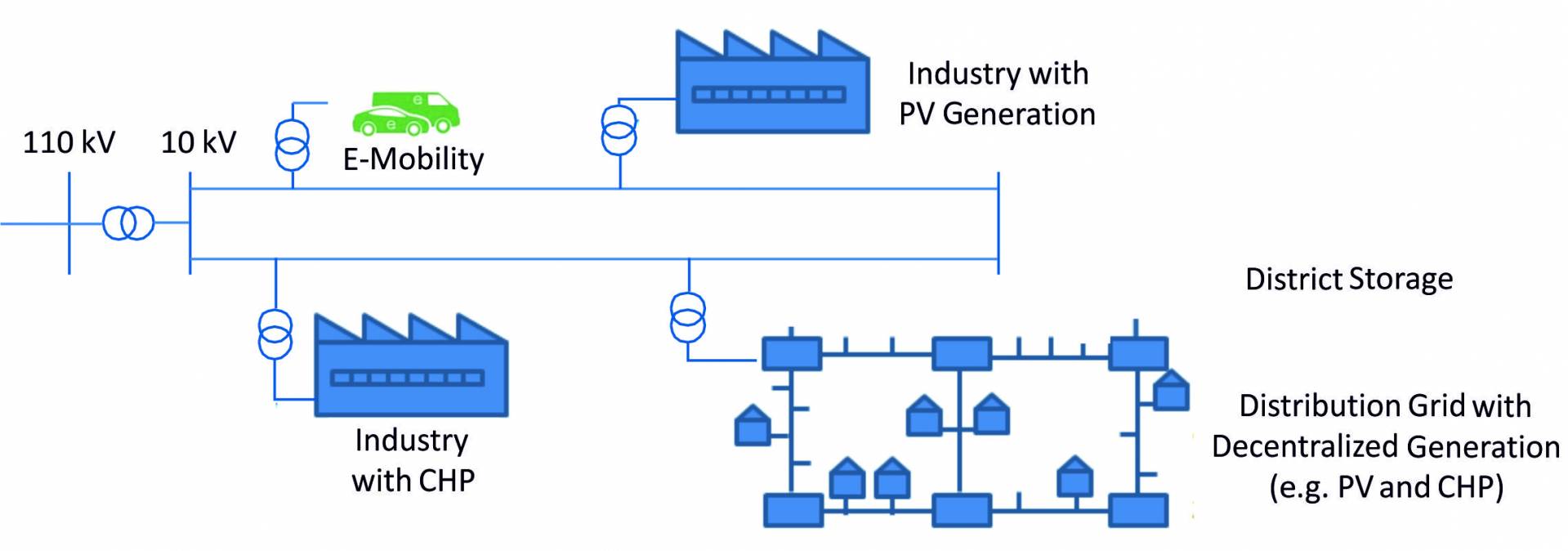
Scientific Assistant:
- Simon Kreutmayr
Project Partner:
- SWM Infrastruktur GmbH & Co. KG, Munich
- Augsburg University of Applied Sciences, Prof. Dr.-Ing. M. Finkel MBA
Further Information:
LINDA - Local Island Power Supply and Accelerated Grid Restauration with Distributed Generation Systems in Case of Large-Scale Blackouts (01.08.2015 - 31.07.2018)
Aim of the Project:
In this research project a general concept was developed, which enables a stable off-grid operation with the help of feed-in from decentralized generation plants in case of a long-lasting, large-scale power failure. By using decentralized energy supply systems (hydropower, wind, biomass, PV) in isolated grids, a significantly improved level of supply could be achieved, especially for critical infrastructures. [further information]
In the follow-up projects, this LINDA-concept will be further developed in order to reduce the amount of people involved in the black start of a power plant and to set up a stand-alone grid.In LINDA, the main focus was on active power management.Therefore, the reactive power management as well as the voltage control should be considered more closely. The follow-up projects are intended to create a broader database with regard to different generation and load structures in order to create or improve simulation models. In addition, a tool will be developed to assist system managers in assessing critical system conditions. The suitability of the found solutions is again examined in different field test. As a result, the developed solutions can already be tested in the project and optimized for real use, because "island grid concepts without repetitive "severe" test will not work - our systems/influences in the distribution network are too complex!".
Awards
- Bayerischer Energiepreis 2018, Kategorie 3: Energieerzeugung - Strom, Wärme
- ISGAN Award, Award of Excellence, Honorable Mention | 2019, Vancouver
Final Report (in German)
Further Television Contributions
Central Research Topics in LINDA:
- Conception and operation of isolated grids
- Development of a simulation model
- Integration into the power system
- Further development of the operating systems
- Development of a load management concept
- Planning and execution of field trial
LINDA Project Partner:
- Bayerische Elektrizitätswerke GmbH, Augsburg
- Hochschule Augsburg, Augsburg
- LEW Verteilnetz GmbH, Augsburg
- marquis Automatisierungstechnik GmbH, Herbrechtingen
- MTU Onsite Energy, Augsburg
- PSI AG, Aschaffenburg
- Stellba Hydro GmbH & Co. KG, Herbrechtingen
- TU München
- supportet by BMWi
Conferences, Meetings:
- Cluster-Forum: stromausfall - versorgungssicherheit im inselnetzbetrieb mit dezentraler einspeisung; November 2017; Programm der Fachtagung: Flyer Cluster-Forum
- LINDA: Local Island Power Supply with Distributed Generation Systems in Case of Large-Scale Blackouts - Concept, Field tests, Lessons Learned; IEC SC8B Spring Meeting, Technical tour, Augsburg, 24.05.2019
- Konzept für eine lokale Inselnetzversorgung mit dezentralen Erzeugungsanlagen bei großflächigen Stromausfällen, HS Augsburg, Besuch IEEE Joint IAS/PELS/IES German Chapter, 23.03.2018





